Best Free SSL Hosting Providers in 2024
Our independent research projects and impartial reviews are funded in part by affiliate commissions, at no extra cost to our readers. Learn more
When choosing a web host, there are a ton of things to think about, but security should be at the top of your list. After all, robust website security not only helps to reassure website visitors that their data and private details are safe but it’s also good for your SEO, too.
Website security starts with a Secure Socket Layer (SSL) certificate, a special digital file that keeps your connection safe and prevents malware from putting visitors at risk. They usually cost anywhere from $19.99 to $260 per year, but if you’re on a budget, don’t panic! Most hosting providers, such as Bluehost, will give you one for free if you sign up for a paid plan.
But how do you know which free SSL hosting provider is right for you? There are so many to choose from, all offering different things. Below, we’ve listed the top four free SSL hosting platforms to help find the best option for your website.
So, are you ready to find your perfect free SSL hosting provider? Read on!
#1. Bluehost
5 out of 5 stars
Overall Rating: 4.8/5
Best free SSL hosting for businesses that use WordPress
| ✔️ What We Liked | ❌ What We Didn't Like |
|---|---|
| ●Sources free SSL from Let’s Encrypt SSL which is a respected and reliable provider ●The SSL installation is automatic – Bluehost does it for you ●WordPress’ recommended hosting platform ●It’s easy to use and navigate for beginners ●Excellent help and support on hand to help with any issues. | ●The SSL is only free for the first year and then you’ll need to pay for it ●Backups are inconsistent and dependent on your plan ●Bluehost’s uptime could be better ●Its plans are pricier than others. |
Plans and Pricing
When it comes to pricing, Bluehost is slightly more expensive than its competitors but it provides a free SSL certificate across all of its plans, regardless of price.
As well as shared hosting, Bluehost also offers dedicated hosting and VPS hosting, too. Additionally, it’s recommended by WordPress itself for its WordPress plans. For shared hosting, Bluehost has four plans:
| Plan | Term Length | Entry Price (per month) | Renewal Price (per month) |
|---|---|---|---|
| Basic | 12 months | $2.95 | $11.99 |
| Choice Plus | 12 months | $7.45 | $21.99 |
| Online store | 12 months | $12.95 | $26.99 |
| Pro | 12 months | $18.95 | $28.99 |
Unless you’re starting an online store (in which case we’d suggest opting for the Online Store plan), we’d recommend starting with Choice Plus if you’re looking for the best value. Not only does it give you 40GB of storage compared to the Basic plan’s 10GB, but it also allows you to host up to three websites, all of which come with an SSL certificate.
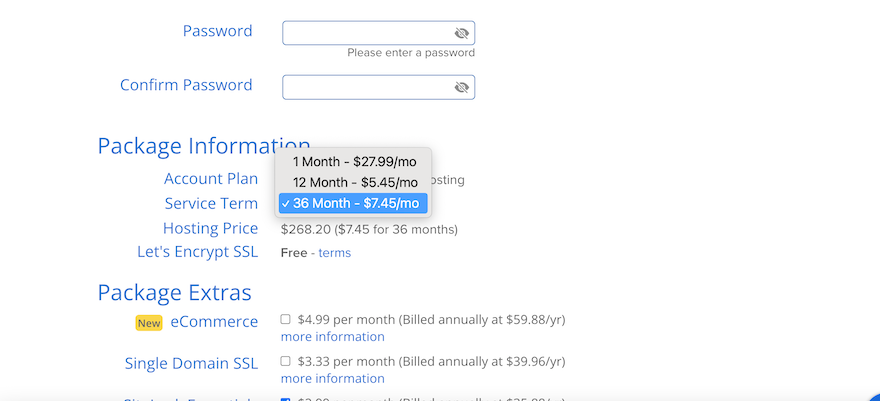
Speaking of SSL certificates, there aren’t any hidden costs with the free one Bluehost offers, but it is worth noting that it’s only free for the first year. After that, you’ll need to pay for it yourself. The cost of an SSL certificate can vary, but in this case, you can expect to pay around $40 annually.
Hosting plans come with different term lengths. These can vary anywhere between 1 month and 36 months, but generally, the longer the term you opt for, the cheaper your monthly payments will be. This will mean you’ll pay less in the long-term, but often opting for a longer term means a larger initial outlay which your budget might not allow for.
Secure Website Communication
Bluehost’s free SSL is provided by Let’s Encrypt SSL, the most common Certificate Authority (CA) among hosting platforms. Despite being free, it offers a layer of security that’s consistent with the majority of websites on the internet. This means you can rest easy knowing it’s providing a secure server connection.
When you purchase your Bluehost plan, you won’t need to do anything to get your SSL certificate up and running – this will be done automatically for you using AutoSSL. If, however, you want to double-check that everything is as it should be, you can do so easily from the “Security” tab in your Bluehost Account Manager.
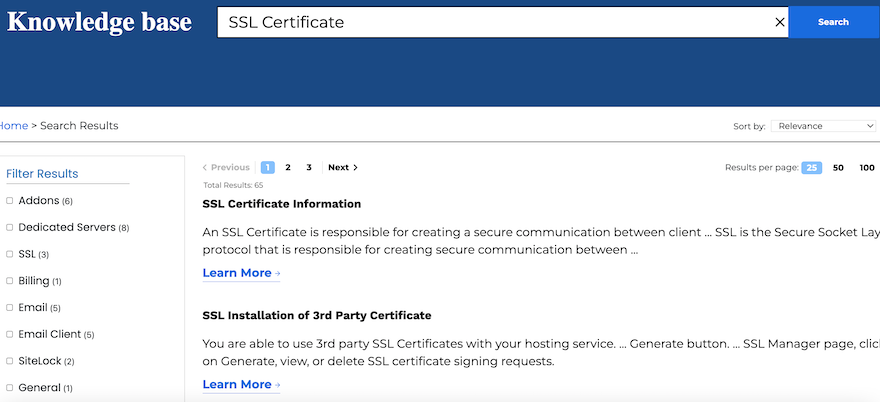
If you want extra protection, Bluehost has some add-ons you can purchase such as SiteLock Essentials to help defend your website from malicious attacks. You also have the option of adding an extra single domain SSL for $39.96 per year if you need it.
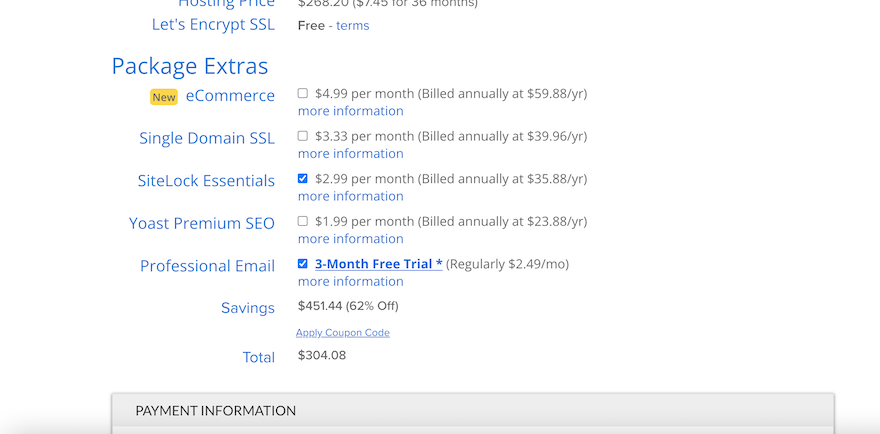
One downside of Bluehost’s security is its lack of consistent backups. For example, no backups are offered to users on the Basic plan, but if you opt for Choice Plus or above, you’ll get free daily backups for a year. Bluehost largely encourages users to manage their own backups which can take up a lot of time.
Customer Support
One of the things we like best about Bluehost is its responsive customer support. If you have any problems with your SSL certificate, you can get in touch via phone or live chat. When we tested the live chat, Bluehost responded very quickly with a helpful answer to our query.
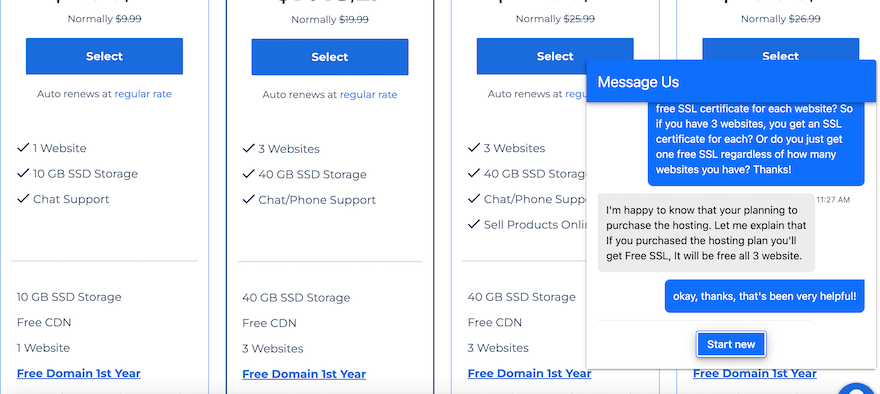
If you’d rather fix the problem yourself, Bluehost’s knowledge base is one of the best we’ve come across. It has articles covering all sorts of topics, including what an SSL is and how to manage the free one you get with your Bluehost account. Also, the search function is excellent, so you’ll have no issues finding the right answers to your questions!
Who is Bluehost for?
| Recommended For | Not Recommended For |
|---|---|
| ●Small businesses that want robust help and support ● Any business planning to use WordPress to build their site or online store. | ●Businesses on a tight budget ● Users who want the security of regular, free backups |
More Information
Bluehost Review: Read our full review if you want to take a closer look at what Bluehost has to offer
Bluehost Pricing: If you’re curious about Bluehost’s pricing, take a look at our article to find the right plan for you
#2. HostGator
5 out of 5 stars
Overall Rating: 4.7/5
Best for businesses who want robust SSL support
| ✔️ What We Liked | ❌ What We Didn't Like |
|---|---|
| ●Sources free SSL from Let’s Encrypt SSL which is a respected and reliable provider ●HostGator will auto-install your SSL for you ●All of HostGator’s plans are very affordable – ideal if you’re on a budget. ●It has a good range of add-ons that you can purchase to increase your website security ●Offers excellent support, especially around SSLs | ●You’ll need to manually enable HTTPS ●HostGator doesn’t offer free daily backups ●The control panel is outdated and can feel a little clunky |
Plans and Pricing
The good news is that all three of HostGator’s plans come with a free SSL certificate. If you opt for the Baby plan or the Business plan, both of which support two or three websites respectively, you’ll get a free SSL for each website you run.
HostGator’s plans are as follows, along with their renewal price:
| Plan | Term Length | Entry Price (per month) | Renewal Price (per month) |
|---|---|---|---|
| Hatchling | 36 months | $2.75 | $9.99 |
| Baby | 36 months | $3.50 | $14.99 |
| Business | 36 months | $5.25 | $19.99 |
Of these plans, we’d recommend the Baby plan as the best value. It supports up to two websites, has 20GB of storage, and allows you to access all support channels, all for less than $5 per month. If you opt for a shorter term, these prices increase, so choosing the longer option will help to save you money in the long run.
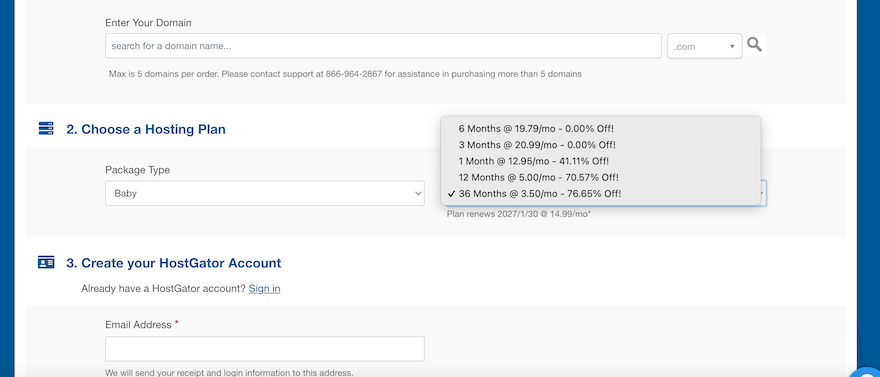
Just like the cost of your plan will change when you renew, so too will your free SSL. That’s because, like Bluehost, HostGator only offers a free SSL for the first year. After that, you can expect to pay around $40 per year or $3.33 per month.
Secure Website Communication
As with most popular hosts, HostGator’s free SSL is provided by Let’s Encrypt, so you can rest easy knowing that it comes from a reliable CA and meets the most recent security standards.
This also means that installing and activating your SSL is straightforward. Once you’ve purchased your plan, you can check your certificate’s status in the “Settings” tab in the “Websites” section of the HostGator Customer Portal.
If you don’t see an active SSL, click the three dots in the top corner to run the AutoSSL function, which will kickstart the process.
In addition to the free SSL certificate, HostGator also offers SiteLock Essentials (billed annually at $39.96) as an extra that can be purchased when you choose your hosting plan.
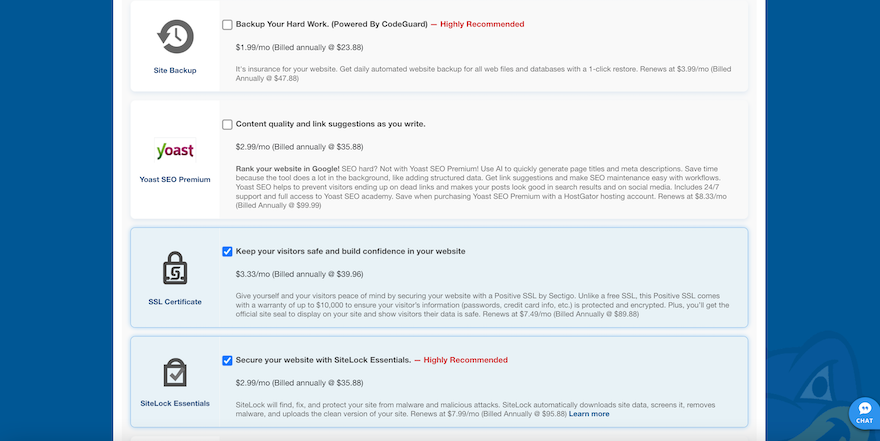
If you want consistent, daily backups, you’ll also need to purchase a subscription to CodeGuard, which costs $23.88 per year, or $1.99 per month. If you opt to skip this, HostGator does include a backup service in your plan, but it’ll only keep your backups for one week and if you ever need them to restore your site, you’ll need to use the service.
Customer Support
HostGator’s customer support is determined by the plan you choose. If you opt for the cheapest Hatchling plan, you’ll only have access to live chat. If you’re on the Baby or Business plan, you’ll get live chat and phone support.
Although there isn’t a dedicated support team for SSL issues, when we tested HostGator’s live chat function, we found that we could select SSL and security as one of the options when giving more information about our query. The agent we were connected with then responded to our questions promptly, giving us the answers we needed.
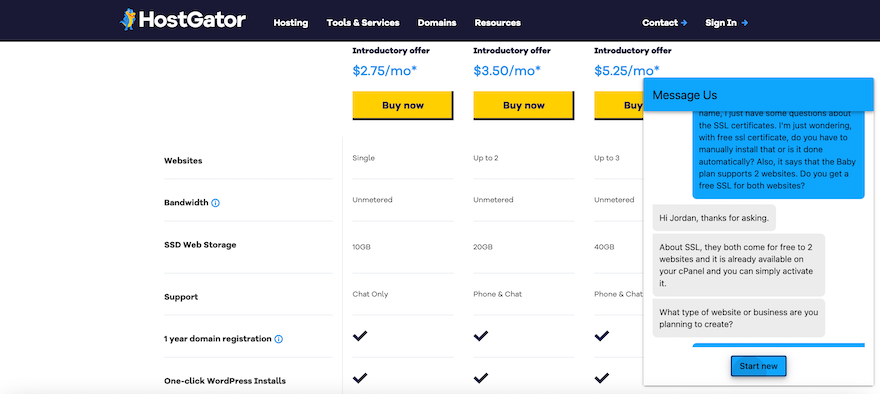
We also found HostGator’s knowledge base to be very useful. The search function gave us access to a good list of SSL-related articles on everything from how to install your free SSL to how to buy one in the first place. We’re confident that if we had any issues, we’d be able to find a solution in HostGator’s library of articles.
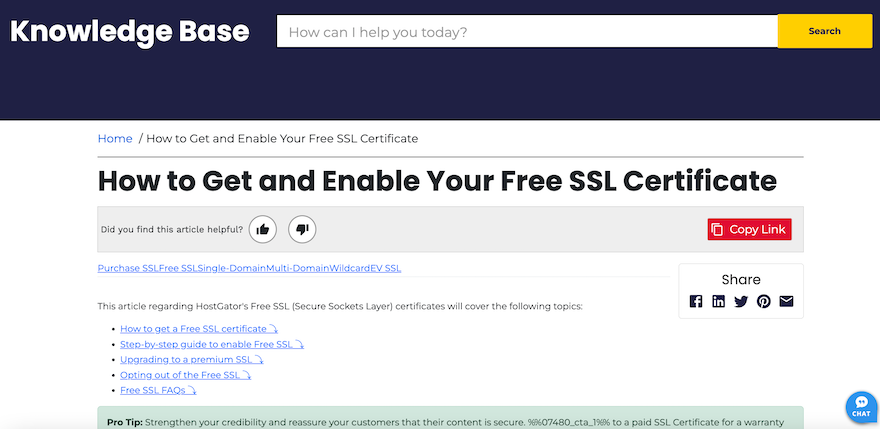
Who is HostGator for?
| Recommended For | Not Recommended For |
|---|---|
| ●Small businesses looking for cheap but reliable shared hosting plans ● Businesses that want to use live chat to answer SSL-specific questions | ●Businesses that want to build a large and complex website due to lower storage ● Businesses that don’t want to pay for extra security tools |
More information
HostGator Review: If you want a more in-depth analysis of what HostGator can do and the features it offers, check out our full review.
HostGator Pricing: If you’re more interested in how cost-effective HostGator’s plans are, our pricing review will give you all the information you need.
HostGator vs Bluehost: Can’t decide between HostGator and Bluehost? Take a look at our direct comparison!
#3. InMotion
4.5 out of 5 stars
Overall Rating: 4.5/5
Best for businesses that want extra security features
| ✔️ What We Liked | ❌ What We Didn't Like |
|---|---|
| ●Sources free SSL from Comodo which is a respected and reliable provider ●Although InMotion doesn’t use auto-install, it’s still very easy to get your SSL up and running ●The AutoSSL makes sure all of your domains are protected, renewing your certificates automatically ●InMotion’s plans are very affordable ●Has an extensive security suite for boosted security ●Offers a 90-day money-back guarantee | ●The cheapest shared plan doesn’t come with a free domain ●Daily backups will cost extra ●Phone support is only available on more expensive plans |
Plans and Pricing
InMotion has plans for all sorts of hosting, from shared and VPS to dedicated and WordPress. All of its packages come with a free basic SSL to keep your website secure. Here are the four plans that InMotion offers for shared hosting:
| Plan | Term Length | Entry Price (per month) | Renewal Price (per month) |
|---|---|---|---|
| Core | 36 months | $2.29 | $8.99 |
| Launch | 36 months | $4.99 | $11.99 |
| Power | 36 months | $4.58 | $15.99 |
| Pro | 36 months | $11.91 | $22.99 |
Although the Core plan seems budget-friendly, we’d recommend avoiding it because it doesn’t come with a free domain, meaning you’ll have to purchase one separately. The Power plan offers the best value for money, supporting unlimited websites and bandwidth, and giving you access to phone support alongside the standard live chat.
It’s worth noting the Pro plan is the only plan that allows you to pay monthly. However, we don’t recommend this because it works out as the most expensive option in the long run, costing $19.99 per month.
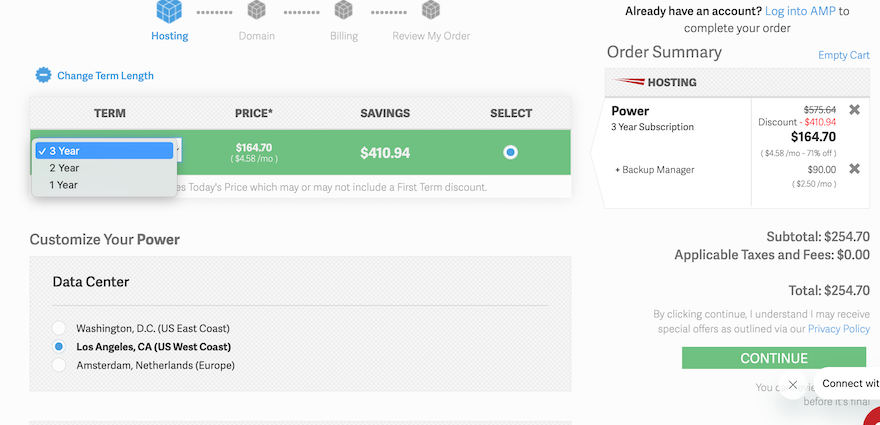
When it comes to the number of websites included with your plan, all of them will get an SSL certificate. Plus, the AutoSSL that InMotion uses automatically assigns a certificate for all domains associated with your account.
Secure Website Communication
Unlike the other providers in this list, InMotion doesn’t use Let’s Encrypt for its free SSL certificates. Instead, your free SSL will come from Comodo, another highly reputable CA.
Once you’ve chosen your hosting plan, installing your free SSL is as easy as clicking a button – literally! All you need to do is click on “Manage Free Basic SSL” in your Account Management Portal (AMP) and then “Enable Free SSL”. Done!
Don’t panic if your SSL isn’t generated immediately, though. Sometimes this can take a little time, so just be patient. If, however, it still doesn’t seem to be working, we’d first recommend double-checking that your domain is pointed towards InMotion’s servers. If they aren’t, your free SSL won’t work. If you’re not sure how to do this, InMotion’s knowledge base has a comprehensive guide to help you troubleshoot this issue as well as plenty of others.
One of our favorite things about InMotion’s AutoSSL is that it automatically renews your SSL certificate, so you never have to worry about it expiring. In addition to this, it regularly scans your websites to make sure that all of your domains are protected. If they aren’t, it’ll generate a certificate to do just that!
In addition to the free SSL InMotion provides, it also offers a security suite with all of its plans. This includes hacking and malware protection, DDoS protection, and automatic backups. These backups are determined by you and there’s a dedicated 24/7 support team to help you set this up.
If you want backups to run daily, though, you can opt to purchase InMotion’s Backup Manager. This is charged at an upfront cost of $60 and it gives you access to InMotion’s secure backup servers, allowing you to restore your website with just one click.
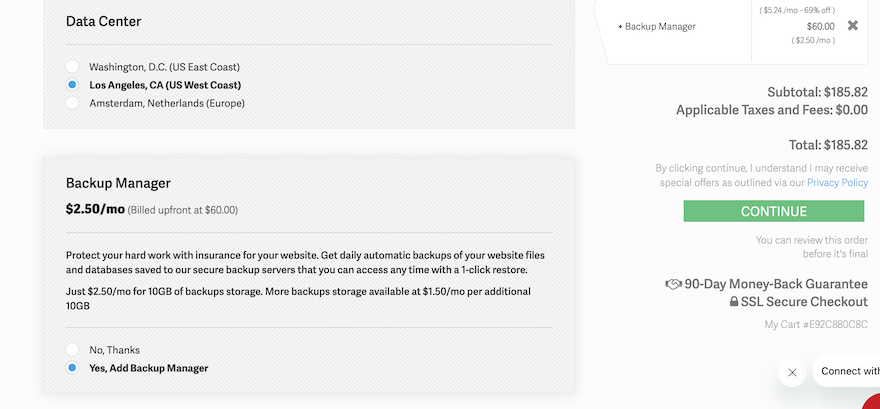
Customer Support
Live chat is standard across all of InMotion’s plans, however, if you want access to phone support, you’ll need to upgrade to the Power plan at the least. Saying this, when we tested InMotion’s live chat, we found it easy to get answers about its SSL certificates and security suite. There wasn’t a dedicated option for this, but that didn’t affect the quality of the response, although we did find the language to be slightly sales-y at times.
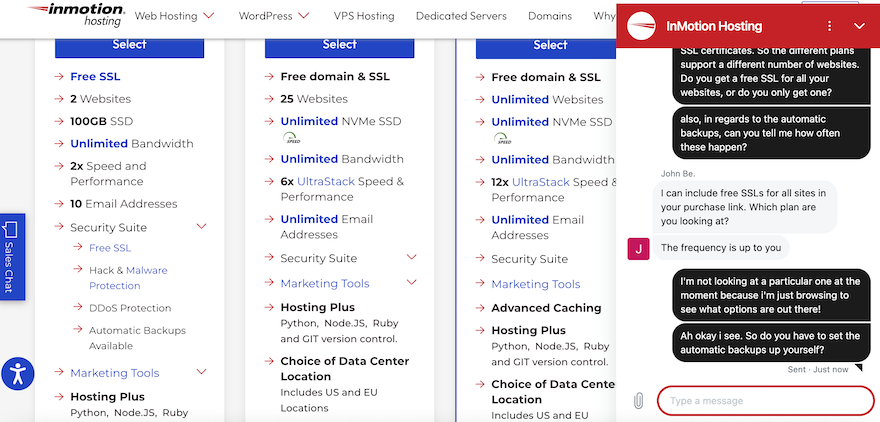
We found the Support Center to be helpful, too. In addition to the usual collection of articles, we also had access to explainer videos and even infographics to help with the installation of SSL certificates. You can even access the live chat from the Support Center if you have questions. Very handy!
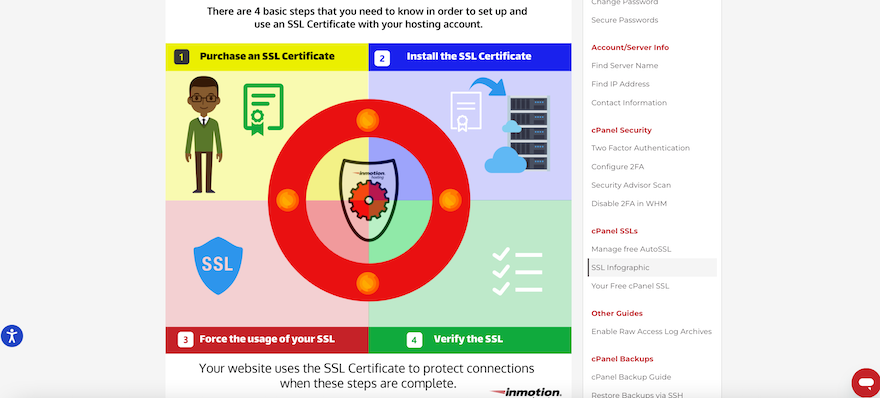
Who is InMotion for?
| Recommended For | Not Recommended For |
|---|---|
| ●Medium to large businesses that want increased security features ● Businesses that want the stress of managing SSLs handled for them | ●Smaller businesses that don’t need as many features ● Businesses looking for Windows hosting – InMotion only supports Linux servers |
More information
InMotion Review: Interested in what InMotion can offer you? Take a look at our full review for a closer look at this popular hosting platform.
#4. Hostinger
4 out of 5 stars
Overall Rating: 3.6/5
Best for businesses with lots of websites
| ✔️ What We Liked | ❌ What We Didn't Like |
|---|---|
| ●Sources free SSL from Let’s Encrypt SSL which is a respected and reliable provider ●SSL is free forever, for an unlimited number of websites ●The free SSL renews automatically, so you don’t need to monitor expiry dates ●All plans come with extra security tools ●Hostinger’s plans are very good value for money ●The tutorial library is a very useful and unique element of Hostinger’s support system. | ●Hostinger doesn’t offer free SSLs on its VPS hosting plans ●Those users on the cheapest plans won’t have access to priority support ●The cheapest plans also don’t support WooCommerce |
Hostinger is well-known for being a budget-friendly option that doesn’t skimp on its features and this is especially true when it comes to security. All of its plans – apart from its VPS plans – come with unlimited lifelong SSLs which is a huge thumbs up in favor of this hosting provider.
Take a look at its three shared hosting plans below:
| Plan | Term Length | Entry Price (per month) | Renewal Price (per month) |
|---|---|---|---|
| Premium | 48 months | $2.49 | $7.99 |
| Business | 48 months | $3.69 | $8.99 |
| Cloud Startup | 48 months | $8.99 | $19.99 |
Hostinger’s starter plans are all affordable, but its renewal prices are pretty reasonable, too, especially considering the features this provider offers to those on a budget.
Even better, there really are no hidden costs when it comes to the free SSL – it’s completely free forever! And you can generate as many certificates as necessary for your domains and subdomains to ensure your website is secure at all times.
Out of the shared hosting plans, we’d recommend opting for the Business plan. You don’t pay much more compared to the Premium plan, but for that little bit extra you get double the storage (200GB), daily backups, and a free CDN (Content Discovery Network). Plus, the Premium plan doesn’t support WooCommerce, which is a big downside for WordPress users who want to open an online store.
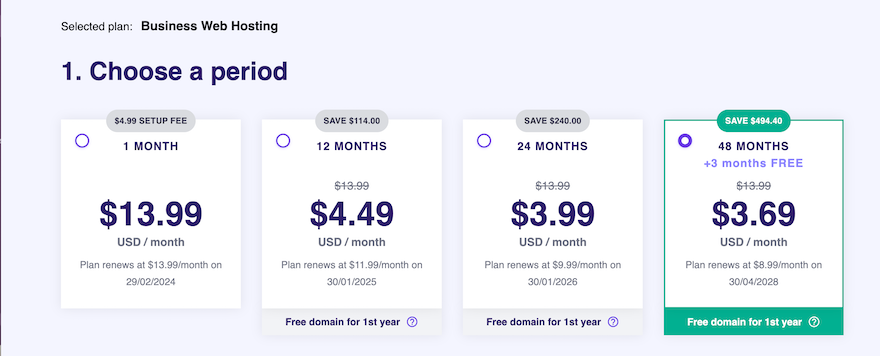
Secure Website Communication
Hostinger’s SSL certificates come from Let’s Encrypt, which specializes in free SSLs. Ultimately, this means that your domain’s security is in good hands!
When it comes to setting your SSL up, you can sit back and relax because Hostinger does it all for you. As soon as you select and purchase your hosting plan, Hostinger will automatically set the wheels in motion. This is the same for renewals – the process is automated so you don’t need to worry about your SSL expiring.
If a problem occurs with your SSL and you need to fix it manually, Hostinger’s Knowledge Base provides a detailed step-by-step to help you out.
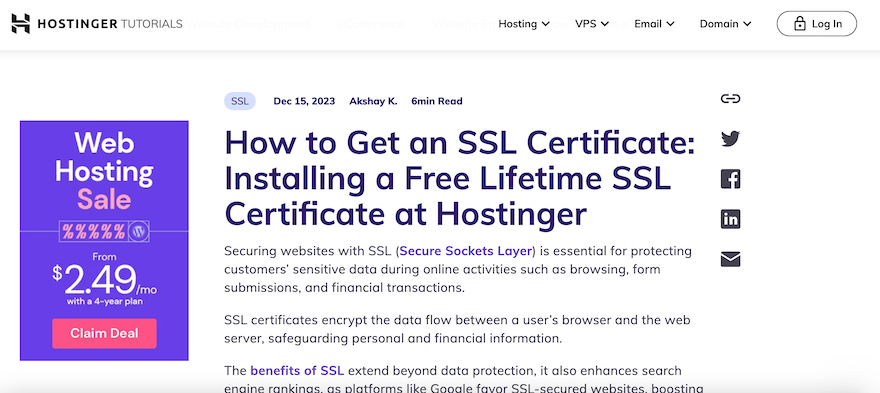
It’s clear that Hostinger takes your website’s security very seriously, and every plan comes with a host of security tools such as DDoS protection, a web application firewall, Cloudflare-protected nameservers, a malware scanner to protect your site from malicious attacks, and a secure access manager so you can decide who has access to your hosting account and what they can see.
Customer Support
Like other providers on this list, the level of customer support you’ll receive from Hostinger is decided by the plan you opt for. Those on the Premium or Business plans won’t have access to priority support like Cloud Startup customers. However, everyone can contact Hostinger via email or through the 24/7 live chat.
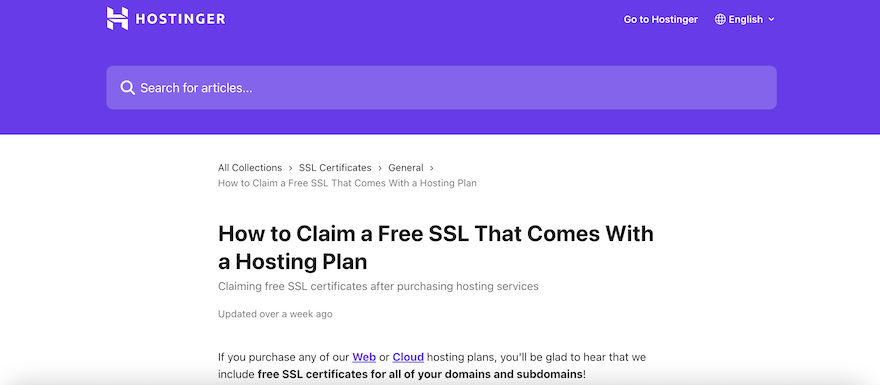
Although there isn’t a dedicated SSL troubleshooting team, Hostinger’s unique tutorial library has a great host of step-by-step how-tos, while the more traditional knowledge base is full of useful articles designed to deepen your hosting understanding.
We particularly liked the live-chat-like search feature that allows you to find and display a tutorial in the chatbox so you can reference it as you go, instead of having to switch between tabs.
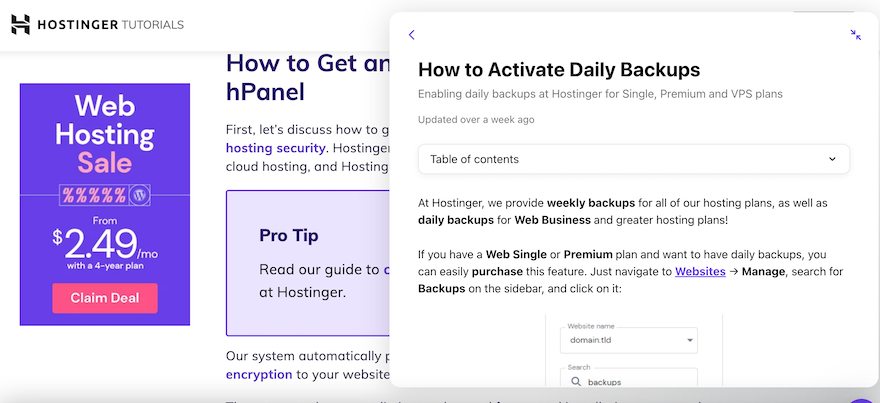
Who is Hostinger for?
| Recommended For | Not Recommended For |
|---|---|
| ●Medium to large businesses that want increased security features ● Businesses that want the stress of managing SSLs handled for them | ●Businesses interested in VPS hosting plans with free SSL certificates ● Businesses who want unlimited scalability – Hostinger has no dedicated hosting which makes this difficult |
More Information
Hostinger Review: Want to find out more about what Hostinger offers? Take a look at our deep dive into this provider in our full review.
Hostinger Pricing: If you want more information on Hostinger’s excellent value plans, our pricing reviews can help you out.
Hostinger vs Bluehost: Spoilt for choice? Check out our comparison of Hostinger and Bluehost if you want a helping hand.
How To Choose a Hosting Provider With Free SSL
Once you’ve found those all-important free SSL hosting providers, you need to choose the one that’s the best fit for you. So what do you need to look for when making this decision?
Types of Hosting
First off, it’s important to check that your chosen provider offers the type of hosting you want. For example, if you’re interested in cloud hosting, out of these providers, only Hostinger offers this. And if you’re on a tight budget, but want to build a WooCommerce store, Hostinger’s plans might be the most affordable, but its cheapest plan isn’t WooCommerce-compatible.
SSL Specific Considerations
When it comes to SSL certificates, there are a few things to think about. Firstly, how long does the free SSL last? If it’s only a year, are you prepared to pay for it thereon out? Will you receive a certificate for all your domains and subdomains? Will you have to renew the SSL certificate yourself, or will it auto-renew? How manual or technical is the setup?
Security
And it’s not just the SSL certificate that’s going to ensure your website stays safe. Security is a team effort, so you’ll need the power of multiple tools such as DDoS protection, malware scanners, and even SiteLock Essentials – if you’re willing to pay extra for it – to keep everything safe and secure. And if something does go wrong, regular backups will allow you to restore anything that’s lost.
Plan Features
Aside from the free SSL, your hosting also has to serve a practical purpose and host your website, so choose a plan that gives you enough storage and bandwidth. It’s key to make sure that your selected plan is one that you can afford and fits comfortably into your monthly budget, too.
How We Test Hosting Providers
The advice and judgements in this article aren’t just pulled from thin air. Instead, all the providers listed go through a rigorous research process that allows us to give fair and unbiased recommendations designed to help you make the best decision for your needs.
We’ve studied 13 hosting providers in-depth, focusing on shared, WordPress, VPS, and dedicated hosting. Each host was analyzed according to its performance in five key areas:
- Price – is it good value?
- Performance – is it dependable?
- Features – what essentials are included?
- Help and Support – can you get assistance?
- Market analysis – how does it compare to competitors?
When ranking hosting providers, we take into account the factors that are most important for a particular need or website type. For example, in our free SSL providers ranking, we’ve focused particularly on pricing, security, and SSL-specific features, as well as customer support.
Best Free SSL Providers: Summary
And there you have it! You now know the best free SSL hosting providers that will help to keep your website secure and safe.
SSL certificates are vital for ensuring that your website visitors’ data stays safe and secure, so choosing a hosting provider with a free SSL is an easy and affordable way to boost your website’s credibility.
If you’re still unsure about which host to choose, we’d recommend opting for Bluehost. It’s our top-rated hosting provider and offers great features at an affordable price. We’d also suggest checking out the individual reviews for each of the providers in this list for a more in-depth guide to what they can offer:
Don’t forget to come back and let us know about your experience with your chosen free SSL provider – good luck!
FAQs
Of course, there are unreliable and unofficial SSL certificate providers out there, which you shouldn’t trust to give you a secure SSL. However, as long as you choose an established and reliable provider – like Let’s Encrypt, Comodo, or any of the hosting providers from our list – then a free SSL can be trusted to keep your site safe.
2 comments